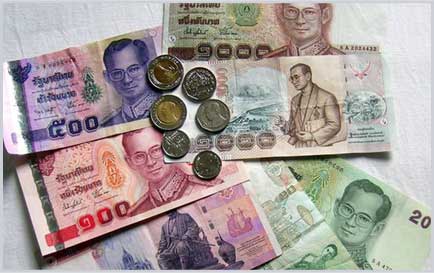
Currency :
Thai Baht is the official currency of Thailand. One Baht is divided into 100 Satang. The coins of this curr ency come in denominations of 1, 2, 5 and 10 Baht as well as 25 and 50 Satang. The people may get some coins of 25 or 50 Satang as change at a supermarket. The denomination of banknotes is as 20, 50, 100, 500 and 1,000 Baht. The most normally used coin is the 10 Baht, while the most generally used note is the 100 Baht. The notes of 20 and 50 Baht have altered with a slightly varied portrait of the King.
ency come in denominations of 1, 2, 5 and 10 Baht as well as 25 and 50 Satang. The people may get some coins of 25 or 50 Satang as change at a supermarket. The denomination of banknotes is as 20, 50, 100, 500 and 1,000 Baht. The most normally used coin is the 10 Baht, while the most generally used note is the 100 Baht. The notes of 20 and 50 Baht have altered with a slightly varied portrait of the King.
Purchasing Thai Baht outside Thailand
Outside Thailand, most suppliers of currency widely stock Thai Baht. However, rates attained in Thailand are greater and money can be exchanged on approach at the rates of more advantage.
Exchanging Cash in Thailand Is Easy
The people can easily exchange cash in Thailand because the booths of FOREX (Foreign Exchange) are very normal and apparently post their daily rates of exchange on the electronic board of notice. All the major currencies are accepted at these booths. The exchange of cash in Thailand is made without incurring any commissions or fees & the foreigners can bring back their home currency without any fees or charges. The foreigners should not purchase any Thai currency until they arrive in Thailand & they must remember to bring bank notes in overall good condition. The bank notes, that are torn, damaged, ripped or excessively stamped/marked, will not be usually accepted at FOREX booths. The rates, which are offered in Thailand, are always better than the foreigners could get back home (for ‘mainstream’ currencies).
Be Respectful When Handling Thai Currency
It is notable that all currencies in Thailand, whether coin or paper, bears a picture (portrait) of His Majesty King Adulyadej, or a dead relative & this country has strictly enforced majestic laws expressly prohibiting any act – physical, written or verbal displaying insolent or disrespectful conduct toward the majestic family. One should never step on a Thai banknote or coin to stop it from blowing away or rolling away respectively. One should not hurl a coin or note in anger towards another person. A note or coin should not be torn, burnt or otherwise defaced.





 Call Us: +91-9891418444
Call Us: +91-9891418444 

